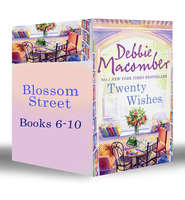По всем вопросам обращайтесь на: info@litportal.ru
(©) 2003-2025.
✖
Dakota Born
Автор
Год написания книги
2019
Настройки чтения
Размер шрифта
Высота строк
Поля
“We could always advertise,” Hassie began tentatively.
“Advertise? We don’t have that kind of money,” Marta said in a sharp voice.
“If we don’t advertise, what exactly do you suggest?” Joshua asked.
Jacob and Marta looked at each other. Jacob got heavily to his feet and leaned forward, bracing his hands on the edge of the table. “I think it’s time we all admitted the truth. Buffalo Valley is doomed and there’s not a damn thing we can do about it.” Marta nodded again, a satisfied expression on her face.
His announcement was met with an immediate outburst from both Hassie and Buffalo Bob.
“Just a minute here!” Buffalo Bob shouted.
“I raised two children in this town,” Hassie cried, “and buried one. I’m not going to let Buffalo Valley die if it’s the last thing I do. Any one of you who—”
“… invested my entire inheritance in this bar and grill,” Buffalo Bob shouted in order to be heard above Hassie.
Joshua slammed the gavel down. “No one said anything about giving up.”
“No teacher’s gonna want to move here.” Marta apparently felt obliged to remind them of this.
“We’ll find a teacher.” Joshua refused to let the Hansens’ pessimism influence the meeting any longer.
“Look around you,” Jacob Hansen said, gesturing at the greasy window that faced the main street.
Joshua didn’t need to look; he confronted the evidence every day when he opened his shop. The boarded-up businesses. The cracked sidewalks, with weeds sprouting up through the cracks. The litter on the streets. Whatever community pride there’d once been had long since died.
“We aren’t going to let the school close,” Joshua stated emphatically.
“I second that!” Hassie said. A deep sense of relief showed on her face, and the determination in her voice matched Joshua’s. He had lived his entire life in this place and he’d do whatever he could to save it. Come hell or high water, they’d find a teacher before school started up again at the end of August.
“I’ll believe it when I see it,” Jacob Hansen said just loudly enough for them all to hear.
“Well, then—prepare to believe,” Joshua said grandly.
There was more life in Buffalo Valley than either of the Hansens suspected, and Joshua was going to prove it.
Lindsay Snyder felt the anger churning in her stomach, anger at her own foolishness as much as anything. With her dogs sound asleep at her feet, she sat at her kitchen table and wrote in the pages of her journal. Whenever she was upset, she described her feelings; it helped her clarify them, helped her analyze what had happened and why. This time, though, she already knew the answers.
When she finished, she set the leather-bound book aside and stared sightlessly out her apartment window. But it wasn’t the landscape she saw; it was her future.
Monte was never going to marry her.
She should have recognized it two years ago, and hadn’t. She realized it was because she so desperately wanted to be his wife, wanted to have a family with him. She loved him, and wasn’t marriage supposed to be the natural outcome of loving a man? But she’d allowed herself to see what she’d hoped to see. She’d allowed herself to believe she could convince him.
Monte hadn’t lied to her, hadn’t misled her. From the beginning, he’d told her he wasn’t interested in marriage. He loved her, he said, but his divorce several years earlier had devastated him and he’d vowed not to repeat the experience. He’d never indicated in any way that he might change his mind. Lindsay knew there was only one person to blame for her unhappiness—and it wasn’t Monte.
Soon—maybe six months—after their relationship had begun, she’d left him because he’d been adamant on the subject of marriage. He’d persuaded her to come back and she had, foolishly believing that eventually he’d change his mind and see things the way she did.
It hadn’t happened.
The phone rang and Lindsay glanced at the caller ID, relieved and at the same time depressed to see that it wasn’t his number.
“Hello,” she mumbled into the phone.
“It’s Maddy.”
“I know.”
“Hey, it’s a beautiful summer afternoon and you sound like you’ve just lost your best friend. However, I know that can’t be the case, ‘cause I’m your best friend.”
Lindsay sighed, wondering why Maddy had to seem so carefree and happy when her own world was falling apart. “Nothing’s wrong. Let me amend that. Nothing’s wrong that hasn’t been wrong for the past two years.”
“Ah, then this has to do with Monte. What happened?”
“Nothing.” That much was true. “Monte and I went out to dinner last night and took a romantic ride in a horse-drawn carriage around Chippewa Square. The magnolias were blooming and Maddy … it was perfect. Until—”
“Until what?”
Lindsay squeezed her eyes shut because even saying the words caused her pain. “Until I made the mistake of mentioning the future. The way he reacted, you’d think that was a dirty word. The next thing I knew, he was angry with me and we were arguing. And then I saw what I should have recognized all along—Monte is never going to marry me.”
At first Maddy said nothing. “Are you breaking it off?”
“Yes … I already did. It’s over, Maddy.”
“You don’t sound absolutely certain of that.”
“No, I mean it this time. Nothing he says is going to convince me to change my mind. I refuse to do this to myself any more.”
“He told you from the very beginning that he wasn’t going to get married again.”
“I know, I know.”
“I’m surprised you haven’t moved in with him. I know that’s what he wants.”
But Lindsay realized now that even if she had, there still wouldn’t have been any commitment, any permanence. She’d actually considered living with him, and felt only relief that she hadn’t gone through with it. His feelings wouldn’t have changed—and her own anguish would’ve been that much worse.
“So you broke it off for good?”
“It’s over, Maddy. It’s time I opened my eyes and faced reality. I refuse to put my life on hold any longer.”
“Way to go!” Then Maddy sobered. “I know it’s hard, but …”
While in high school, they’d frequently had sleepovers and lain awake talking about the men they’d marry. It’d all seemed so simple back then, and here they were, both nearly thirty and not a husband in sight.
“Remember when we were teenagers?” Lindsay couldn’t keep from thinking about all those silly schoolgirl dreams.
Maddy snorted inelegantly. “We were what you’d call romantic idiots.”
Lindsay shrugged wordlessly. It wasn’t as though either of them thought marriage was essential to a woman’s existence. But they both craved the closeness of a good marriage and the joys of having children. Maddy, at least, had an excuse. As a social worker for the state of Georgia, she worked long hours, looking out for the welfare of others. Almost all the overtime she put in was voluntary. Several nights a week, after work, she taught parenting classes for Project Family, a community-based organization. In addition, she mentored several troubled teenagers. Maddy wanted to save the world and she had a heart big enough to do it.











